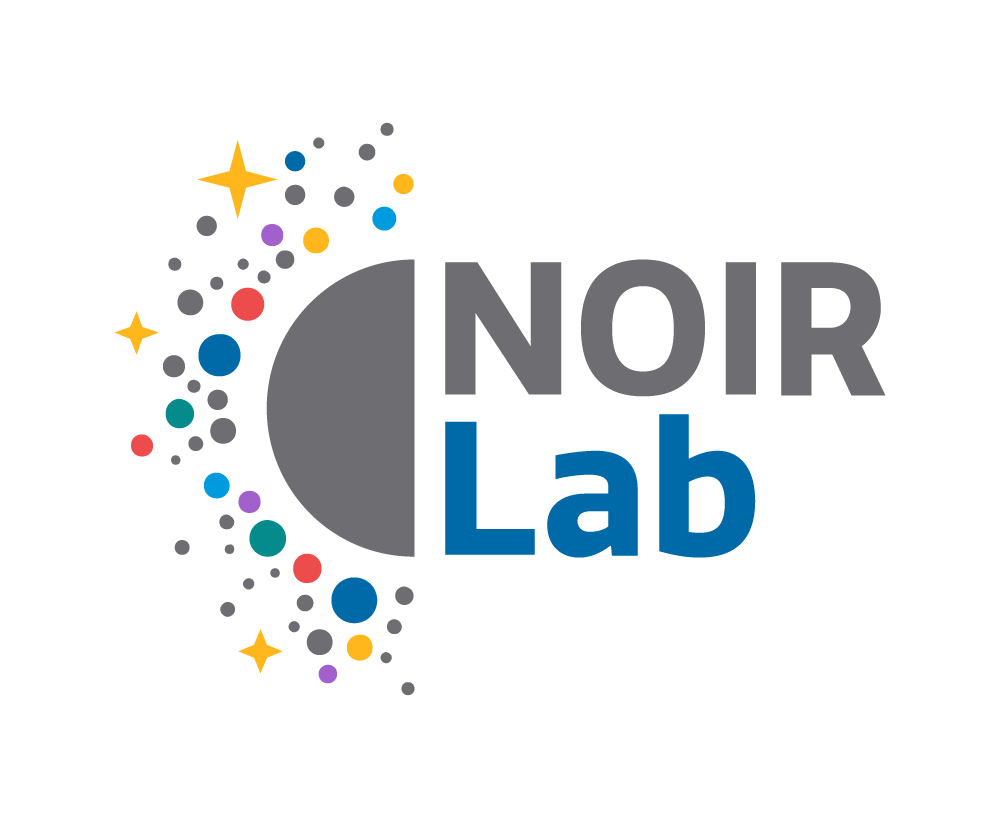NSF NOIRLab to Jointly Lead New AI Institute Funded by U.S. National Science Foundation and Simons Foundation
NOIRLab will help build a new breed of AI-powered tools to revolutionize the way researchers access, process and analyze data
18 September 2024
From the early telescopes made hundreds of years ago by Galileo to the sophisticated astronomical observatories of today, people have built increasingly innovative tools to probe and measure the cosmos. Soon, researchers at two new institutes funded by the U.S. National Science Foundation (NSF) and the Simons Foundation will build a new breed of astronomical tools by harnessing the uniquely powerful abilities of artificial intelligence (AI) to assist and accelerate humanity's understanding of the Universe.
The new National Artificial Intelligence Research Institutes for astronomical sciences are part of the NSF-led National Artificial Intelligence Research Institutes program, which now includes 27 AI institutes across the U.S. The two new institutes, one of which will be jointly led by NSF NOIRLab, will each receive $20 million over five years: $10 million from NSF and $10 million from the Simons Foundation.
“The massive amount of data that will be gathered in the coming years by the NSF–DOE Vera C. Rubin Observatory and other large-scale astronomical projects is simply too vast and rich to be fully explored with existing methods,” says NSF Director Sethuraman Panchanathan. “With reliable and trustworthy AI in their toolbox, everyone from students to senior researchers will have exciting new ways to gain valuable insights leading to amazing discoveries that might otherwise remain hidden in the data.”
Both institutes aim to advance the capabilities of AI beyond just astronomical sciences so it can become a more useful tool for all scientific disciplines involving large datasets, sophisticated models, and the iterative process of generating and experimentally testing theories.
The new AI Institutes for astronomical sciences are:
NSF-Simons AI Institute for Cosmic Origins (NSF-Simons CosmicAI)
Led by the University of Texas at Austin in collaboration with NSF NOIRLab, the NSF National Radio Astronomy Observatory (NRAO), the University of Utah, the University of Virginia and UCLA, NSF-Simons CosmicAI is set to revolutionize the way we explore the Universe. This cutting-edge institute will develop tools to accelerate traditionally time-consuming aspects of astronomical research, including processing and analyzing large amounts of data and creating and evaluating simulations of complex phenomena, such as dark matter and the chemical processes within stars. The institute will also democratize access to astronomical data and analysis by developing a powerful AI-based assistant that provides accurate responses to advanced scientific queries.
“This is a very exciting opportunity to take NOIRLab’s data-centric activities to the next level and unlock new ways to empower the community to conduct research covering virtually all topics in astronomy,” says Stephanie Juneau, CosmicAI NOIRLab Lead Scientist. “On a personal level, I'm looking forward to also becoming a user of our AI institute and applying advanced techniques to answer key questions about supermassive black holes and how they play a role in galaxy evolution and therefore our cosmic origins.”
NSF-Simons AI Institute for the Sky (NSF-Simons SkAI)
Led by Northwestern University in collaboration with the University of Chicago, the University of Illinois Urbana-Champaign, the University of Illinois Chicago, and the Adler Planetarium, NSF-Simons SkAI will tackle exceptionally complex problems in astrophysics and astronomy across a broad range of cosmic scales, from the physics of exotic objects like neutron stars and black holes, to the formation of galaxies and the roles that dark matter and dark energy play across the entire Universe.
The institutes will seek to empower researchers at all career levels by providing access to trustworthy AI that can rapidly conceptualize and assist in research projects with full access to all published astronomical data and findings.
Training and education for early-career researchers and students is another objective the institutes will pursue over the next five years. The institutes will conduct a variety of outreach activities to broadly disseminate their innovations and help train the AI-literate workforce of tomorrow. Those activities include summer schools for high school students and teachers and the development of online courses allowing scientists and students anywhere in the U.S. to gain certification in the burgeoning field of AI-assisted astronomy.
Launched in 2020, the NSF-led AI Institutes are part of a broad federal effort to advance a cohesive approach to AI-related opportunities and risks, supporting the goals outlined in the White House’s 2023 Executive Order on the Safe, Secure, and Trustworthy Development and Use of Artificial Intelligence. For more information about NSF’s decades-long support for foundational AI research and the AI Institutes program, visit NSF’s Artificial Intelligence webpage.
More information
NSF NOIRLab (U.S. National Science Foundation National Optical-Infrared Astronomy Research Laboratory), the U.S. center for ground-based optical-infrared astronomy, operates the International Gemini Observatory (a facility of NSF, NRC–Canada, ANID–Chile, MCTIC–Brazil, MINCyT–Argentina, and KASI–Republic of Korea), Kitt Peak National Observatory (KPNO), Cerro Tololo Inter-American Observatory (CTIO), the Community Science and Data Center (CSDC), and Vera C. Rubin Observatory (operated in cooperation with the Department of Energy’s SLAC National Accelerator Laboratory). It is managed by the Association of Universities for Research in Astronomy (AURA) under a cooperative agreement with NSF and is headquartered in Tucson, Arizona. The astronomical community is honored to have the opportunity to conduct astronomical research on I’oligam Du’ag (Kitt Peak) in Arizona, on Maunakea in Hawai‘i, and on Cerro Tololo and Cerro Pachón in Chile. We recognize and acknowledge the very significant cultural role and reverence that these sites have to the Tohono O’odham Nation, to the Native Hawaiian community, and to the local communities in Chile, respectively.
Links
Contacts
U.S. National Science Foundation Media
Email: media@nsf.gov
Stephanie Juneau
CosmicAI NOIRLab Lead Scientist
NSF NOIRLab
Email: stephanie.juneau@noirlab.edu
Josie Fenske
Jr. Public Information Officer
NSF NOIRLab
Email: josie.fenske@noirlab.edu


